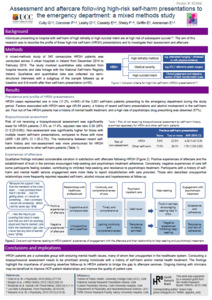Cully, Grace and Leahy, Dorothy and Shiely, Frances and Arensman, Ella (2022) Patients' experiences of engagement with healthcare services following a high-risk self-harm presentation to a hospital emergency department: a mixed methods study. Archives of Suicide Research, 26, (1), pp. 91-111. doi: 10.1080/13811118.2020.1779153.
| Preview | Title | Contact |
|---|---|---|
![[img]](https://www.drugsandalcohol.ie/32267/1.hassmallThumbnailVersion/Assessment_and_aftercare_following_self_harm_presentations_Poster.png)
|
Image (PNG) (Poster - Assessment and aftercare following high-risk self-harm presentations to the emergency department)
- Supplemental Material
168kB |
Experiences of engaging with healthcare services following a self-harm presentation to hospital of high lethality or high suicidal intent have not been examined previously, despite this subgroup of self-harm patients being at high risk of suicide. Therefore, this study addressed this issue by documenting patients' experiences of engaging with healthcare services after a high-risk self-harm (HRSH) presentation to hospital. Demographic, psychiatric and psychosocial factors associated with variations in perceptions of care received were also examined. Quantitative information was obtained by interview administered questionnaires 0-3 months following a HRSH presentation to hospital. Semi-structured follow-up interviews, conducted, 6-9 months later, provided qualitative data ( = 32). Satisfaction with aftercare varied. Positive experiences of care included "" and "" The establishment of trust in the services encouraged help-seeking and psychotropic treatment adherence. Conversely, "" and "" left some participants feeling isolated, contributing to inhibited help-seeking and resistance to psychotropic treatment. Participants with a history of self-harm and mental health service engagement were more likely to report dissatisfaction with care provided. Those who described unsupportive relationships more frequently reported repeated self-harm, alcohol misuse, and hopelessness at follow-up. Our findings show that satisfaction with services, help-seeking and treatment adherence may be improved by ensuring the consistent provision of timely, comprehensive and supportive aftercare following a HRSH presentation. Absence of these aspects of care may contribute to ongoing distress and further suicidal behavior.
G Health and disease > Substance use disorder (addiction) > Alcohol use disorder
G Health and disease > Substance use disorder (addiction) > Drug use disorder
G Health and disease > Substance use disorder (addiction) > Drug use disorder > Drug intoxication > Poisoning (overdose)
J Health care, prevention, harm reduction and treatment > Treatment and maintenance > Patient / client attitude toward treatment (experience)
J Health care, prevention, harm reduction and treatment > Type of care > Emergency care
J Health care, prevention, harm reduction and treatment > Health care programme, service or facility > Hospital
L Social psychology and related concepts > Participation / involvement / engagement / co-production
VA Geographic area > Europe > Ireland
Click here to request a copy of this literature
Repository Staff Only: item control page
